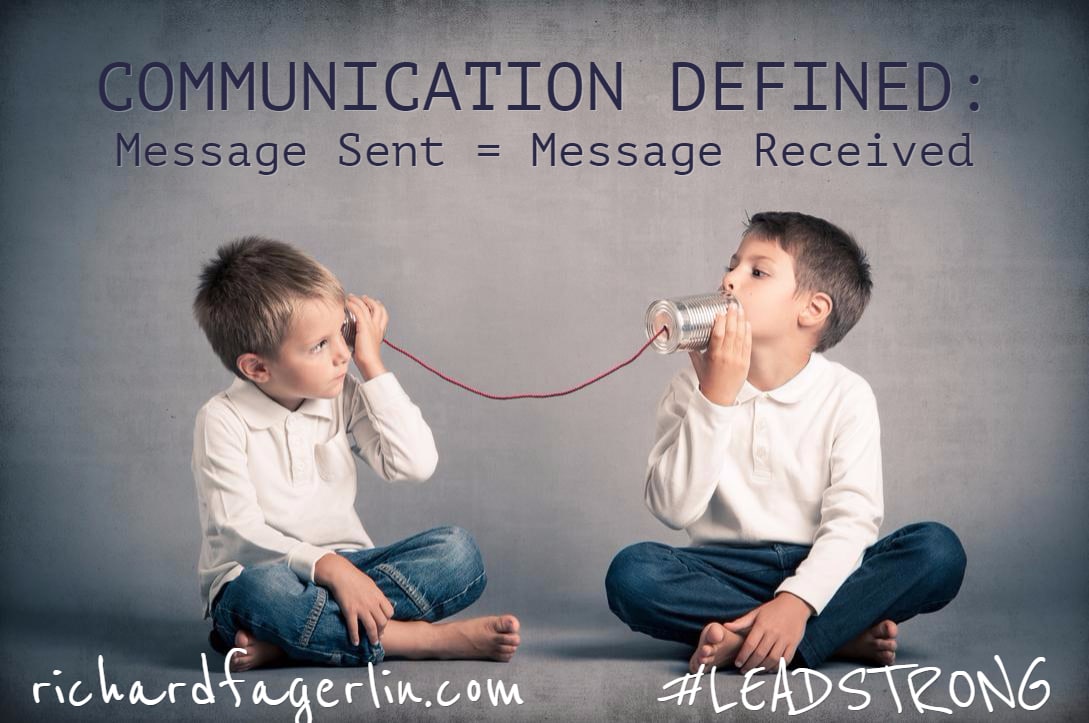Every leader seeks to be an effective communicator – but so few really are. We don’t lack for communication in our day and age. If anything, all of our communication is so deafening we can’t actually hear anything.
There is only one way that true communication takes place and that is when the message that is sent is actually received.
Definition of Communication: Message Sent = Message Received
If you are wondering if the message you are sending is actually being received, analyze your interactions against these 5 common problems leaders face:
- You don’t get clearer, you get louder
You know what you mean and you’re passionate about it, but people just don’t get it. Instead of being more clear or focusing your message, you simply get louder. You keep making your point, you drive your perspective and neglect any clues that others aren’t hearing you. You are asked questions for clarity and instead of answering them, you just keep making the same point again, and again, and again.
Action: When it seems that people just don’t “get it” – change your approach, ask questions and pay attention to non-verbal clues that might point out your need to clarify your message. Consider your words like a plate of food. How can you garnish them so that they are more appealing and palatable for others?
- You assume everyone thinks just like you
The truth is that most people do not think like you. They don’t learn like you, they don’t process information like you and they don’t respond like you. If you keep talking to people and communicating with them only the way you would want to be communicated with you will struggle making sure the message you send is actually received.
Action: Make it your goal to communicate in methods, modes and with vocabulary that make it easy for your message to be heard. If someone prefers details, provide them to them. If another hears best in bullet format, don’t give them the full version. Be willing to learn about your audience and tailor your message in ways that it can be received the way people would best hear it.
- Everyone just seems to not “get it”
In every situation you find frustrating or challenging there is one common denominator and that is you. You are the only common thing in all of your difficult situations. People with this challenge are quick to blame and show frustration to others when they don’t seem to “get it.” Perhaps it isn’t the others that don’t get it – perhaps it is you.
Action: Follow the CPA model and understand that in all situations you are either Causing the problem, Participating in the problem or Allowing the problem. In evaluating your communication failures be sure to enlist your CPA. Evaluate your message and your delivery. Determine what you might be doing to contribute to the miscommunication.
- Answers don’t match the question
Politicians are the best at this. They are asked one specific question and reply with a specific, but very different, answer. We do this too. People with this challenge have an agenda and a plan and it doesn’t matter what questions are asked, their response is already prepared. Or worse yet, they formulating their response while you are talking therefore missing the question entirely. Perhaps this also happens when you feel the need to always be right. Whatever brings you to this challenge, the outcome is frustration and loss of credibility over time.
Action: Don’t answer a question that you aren’t clear about. Use clarifying questions to get to the heart of the matter and make sure you understand the intent and purpose of the question. It may work well to rephrase the question in your own words to make sure you are then answering the right one.
- You have all the answers and don’t learn from mistakes
“A smart man learns from his own mistakes but a wise man learns from the mistakes of others.” Unknown
The challenge here is not a lack of learning, it’s a lack of listening. Without paying attention to history and the lives of others around you, there is no way to effectively learn from mistakes made on a regular basis. This is often due to a high level of self vs. others focus. People that struggle here do way more talking than they do listening.
Action: Develop a 2:1 questions to answers ratio. This shows you really care and will help you learn. Ask good questions, listen intently, and humble yourself. and seek to transfer what you learn to what you do. As the quote above says, a smart man learns from his mistakes but a wise one learns from the mistakes of others. Study what works, what doesn’t and develop an insatiable appetite for learning from others.
Final thought: Communication is hard. Saying what you mean and letting others know your intentions can be difficult. You are the expert on your intentions but you are judged by your actions. If your actions and your intentions don’t seem to match, focus on letting your intentions be known. Share them. Clarify them. Communicate them.
Lead well, lead often & LEAD STRONG.
